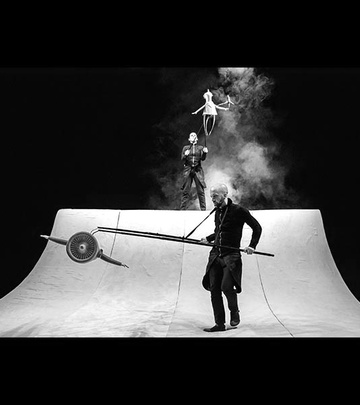
Teatro de Marionetas do Porto
O Teatro de Marionetas do Porto constitui-se em setembro de 1988, uma data simbólica que coincide com a apresentação da companhia na seleção oficial do Festival Mondial des Théâtres de Marionnettes, em Charleville-Mézières.
O reportório da companhia começa por integrar o “Teatro Dom Roberto”, fantoches da tradição portuguesa, que João Paulo Seara Cardoso (1956-2010) herdara das mãos de Mestre António Dias, último representante da geração de bonecreiros itinerantes, em 1980.
Os primeiros espetáculos criados pela companhia são fruto de uma pesquisa do património popular, sobretudo ao nível dos contos e das práticas e rituais teatrais do norte do país.
Por esta altura, na sequência de um convite da RTP, a companhia constitui uma equipa de criação alargada (Sérgio Godinho, Jorge Constante Pereira e Alberto Péssimo) que, durante cerca de dois anos, desenvolve vários projetos televisivos para crianças que viriam, de certa forma, a marcar uma geração e dos quais se destacam “A Árvore dos Patafúrdios” e “Os Amigos do Gaspar”.
O TMP alcança um certo reconhecimento público com a estreia de “Miséria”, em 1991, espetáculo muito bem acolhido pelos espectadores e pela crítica, e que representa também o primeiro apoio financeiro do estado à atividade da companhia. Dois anos depois estreia “Vai no Batalha”, uma revista à portuguesa com marionetas, crítica mordaz ao cavaquismo e à mentalidade portuguesa vigente no início dos anos 90, que fica em cena cerca de um ano com lotações esgotadas.
Testadas algumas fórmulas de teatro popular, inicia-se um novo ciclo radicalmente diferente na história da companhia. Várias experiências em busca de uma certa contemporaneidade do teatro de marionetas têm início com “3ª Estação” (coprodução com o Balleteatro Companhia) que ensaia o cruzamento das marionetas com a dança. Mais tarde, “Exit” (1998), a primeira peça do denominado ciclo urbano, no qual se procura uma reflexão sobre a condição humana pós-moderna, e no qual o teatro de marionetas é contaminado por outras linguagens artísticas como a música, o vídeo, a dança e as artes plásticas assumindo uma dimensão mais performativa, marca definitivamente o assumir de um caminho de risco. Registe-se ainda, nesta fase, a importante participação do TMP no evento “peregrinação” da Expo 98, com “Máquina-Homem/Clone- Fighters”.
Os espetáculos dirigidos a um público infantojuvenil passam a integrar a produção anual da companhia, sempre com base em textos originais posteriormente editados em livro.
É, pois, na segunda metade dos anos noventa que se regista uma forte consolidação do projeto artístico da companhia. A corrente de público portuense alarga-se consideravelmente, obrigando a companhia a abandonar o pequeno teatro de Belomonte e a procurar outros espaços de maior dimensão na cidade. O TMP adquire definitivamente uma projeção
internacional que o leva a apresentar-se regularmente na Europa e em diversos países do mundo (Espanha, França, Irlanda, Bélgica, Holanda, Áustria, Suíça, Itália, Israel, Brasil, Polónia, Cabo Verde, Inglaterra, Marrocos, China, República Checa, Canadá e Alemanha). E cria uma rede de parceiros de programação em Portugal que faz com que, atualmente, cerca
de 30% da atividade se desenvolva em itinerância.
É neste contexto e com uma linha programática consolidada, que o TMP desenvolve a sua atividade a partir do início do novo século. Alguns espetáculos marcam esta fase: “Nada ou o Silêncio de Beckett”, a produção apresentada mais vezes no estrangeiro, “Macbeth”, uma importante experiência de teatro de texto, “Paisagem Azul com Automóveis”, coprodução Porto 2001 e TNSJ e “Cabaret Molotov”, uma incursão no universo do circo e do cabaret.
A abertura oficial do Museu das Marionetas do Porto (em 2013) assinalou os 25 anos da companhia.
© Susana Neves